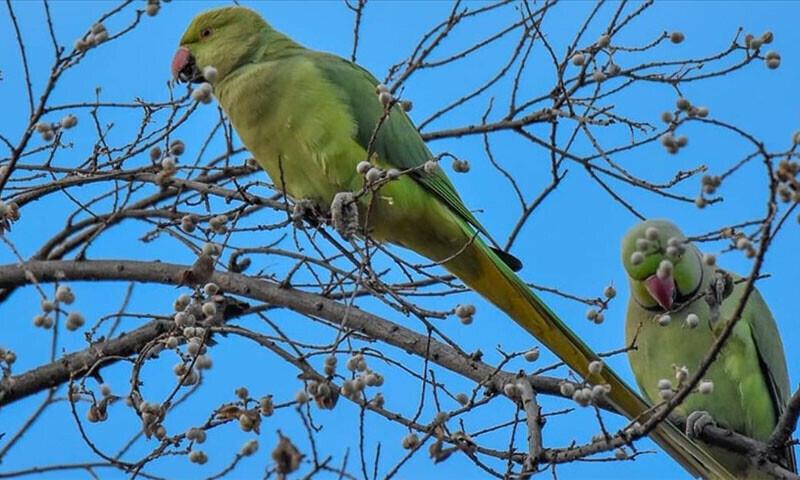Pakistan is in danger of losing one of its famed birds, the Alexandrine parrot, which is already on a global list of near-endangered species due to multiple factors, most of them human-made.
Wildlife experts cite habitat alteration, pollution, poaching and illegal trade as major factors behind the decline in the bird’s population, which is still the largest among the three parrot species found in the South Asian country.
Once abundant in the country’s plains, mainly along canals and foothills, and even in mega cities like Karachi, its population is currently restricted to the upper parts of northeastern Punjab and southern Sindh provinces and the border areas of Pakistan and India, including Jammu and Kashmir.
The tree-filled foothills of the scenic Murree Hill Station are another home to Alexandrine parrots.
“Apart from the systematic destruction of their habitat, they have become a source of income for a sizable number of people across the country, resulting in increasing poaching and subsequently illegal trade,” said Sakhawat Ali, an Islamabad-based wildlife expert.
Speaking to Anadolu, Ali observed that a huge number of Indian rosewood (Shisham or Tali) and Banyan (Ficus benghalensis) trees, the parrots’ favourite nesting places, have been systematically cut down in the agriculture belt of Punjab and Sindh over the past three decades because of their precious wood.
Agriculture authorities, he added, have replaced Indian rosewood with eucalyptus, which is useless for parrots and other human-friendly birds.
Eucalyptus in Pakistan was exported from Australia to feed the country’s matchstick industry and according to some environmentalists, it is environmentally hazardous.
Fast disappearing in big cities
Endorsing Ali’s view, Abdur Razzak Khan, a Karachi-based environmentalist, said that the use of agrochemicals, increasing human influence and pollution are other key factors behind the decline in the parrots’ population in the country, including mega cities like Karachi and Lahore.
In Karachi alone, the parrots’ numbers have plummeted by 60 per cent over the past five to eight years, he told Anadolu.
The alteration of habitats — a direct result of unplanned urbanisation and pollution — has badly affected the population of urban birds in major Pakistani cities in the past two decades, mainly house sparrows and parrots, said Khan.
In addition to Karachi and Lahore, the northwestern city of Peshawar, garrison city of Rawalpindi and textile hub of Faisalabad are among the most polluted cities in the region.
Instead of human-friendly birds like sparrows and parrots, which also serve as indicators of air quality, bird species such as kites, crows and mynas have occupied the skies of these cities, he added.
Predatory birds, mainly kites, often target parrots and sparrows, adding to the decline in the population of human-friendly birds, he said.
Recently, the Islamabad Wildlife Management Board (IWMB), a state-run body dedicated to wildlife conservation, conducted a survey in Islamabad. To its surprise, no Alexandrine parrots were spotted in the capital’s skies, indicating the gravity of the threats facing the bird.
If the situation persists, Khan warned, these birds may hardly be seen in the metropolises.
Lucrative business
The Alexandrine parrot is the largest parrot species found in Pakistan. They have red patches on their wings and are green in colour, with mutations also occurring.
According to Anis Rehman, a wildlife expert based in Islamabad, the Alexandrine parakeet (Psittacula eupatria) is named after Alexander the Great, who is said to have first sent several of the birds from Punjab to the West, where they became popular as exotic pets of rich and noble families.
In addition to its large size, this species has the ability to mimic human speech, which makes it one of the most wanted birds by pet lovers, he added. A chick can earn a poacher Rs10,000-Rs12,000, while an adult Alexandrine parrot is sold for up to Rs50,000 in pet markets, according to Rehman.
“If a poacher catches a group of five to 10 hatchlings and parrots in a month, he can easily earn between Rs100,000 and Rs150,000, which is almost four times higher than the minimum (monthly) salary of Rs37,000,” he said.
Aside from pet lovers, professional breeders also buy wild parrots to crossbreed them with their bred species to improve the latter’s immunity.
Efforts underway to conserve species
The parrots play an important role in seed dispersal, while their nests serve as hibernation sites for several animals, mainly snakes and some squirrel species in the winter.
Many parrot species are in decline, and several are extinct. Of the 350 living species, some 130 are listed as near threatened or worse by the International Union for Conservation of Nature (IUCN).
The bird’s population in Pakistan has not been estimated.
The IWMB in December last year launched an “action plan” in the capital to contain the consistent decrease in the parrots’ population.
“We have registered over 50 breeders and 178 individuals (pet lovers) keeping over 2,200 parrots to ensure they cannot sell these birds into the market. Even their hatchlings will be registered,” said Ali, who also serves as deputy director of research at IWMB.







